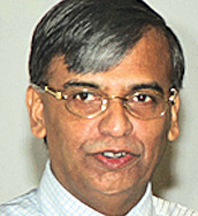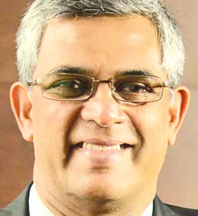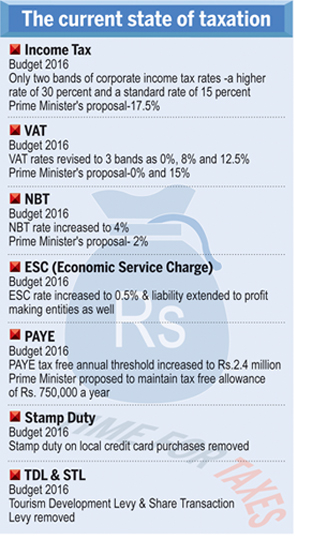|
Top experts say:
Capital Gains Tax deters FDI
by Lalin Fernandopulle
Tax experts said the country is grappling with the challenge as to
what is the ideal combination of taxes to promote businesses and trade
endeavours and for it to be a preferred destination for Foreign Direct
Investments (FDIs).

N.R. Gajendran |

Vajira Kulathilake |

Ravi Abeysuriya |
Tax Consultant and Partner, Gajma and Company, N.R. Gajendran said
the policy statement of Prime Minister Ranil Wickremesinghe provided an
overall direction as to how taxation should be directed as we approach
2020. The salutatory thought was articulated by the Premier that the
ratio of direct tax to indirect tax should move up to 40:60 compared to
the current 20:80.
This is in line with the traditional and accepted thought in fiscal
policy where income tax which is considered a progressive form of tax,
should generate a greater proportion of revenue compared to indirect
tax.
The indirect tax being a consumption tax has a greater adverse impact
on the poorer segment of society. This clearly shows that the
government’s policy is not to impose greater hardship on the
less-privileged people as its objective is to generate a greater
proportion of revenue from the affluent segment. The policy of the
government is that the tax to GDP ratio which is at an abysmal level of
11.7 percent in 2015 to progress to 18 percent by 2020. The dual fiscal
aim is to achieve 18 percent tax to GDP ratio and the direct to indirect
ratio to be 4:6 by 2020. This will be the first step for fiscal
consolidation, Gajendran said.
In achieving these objectives, there has been aberrations in the
fiscal policy making and inconsistencies and uncertainties have emerged
for many reasons such as to achieve the objectives in 2020, ensure the
less-privileged segmental is not burdened which is vital to avoid social
unrest and manage debt and the exchange rate which is a major challenge
faced by the government, he said.
Debt is being rolled over so that the country moves away from the
high cost of debt finance to a manageable level of debt servicing cost.
In this regard, the country will have to face the demands of
multilateral agencies which are prepared to fund at a lower cost. Debt
management is vital because the interest cost for 2016 has been
projected at half a trillion rupees which in absolute and relative terms
has become the significant expenditure for the government.
The current state of taxes is receiving mixed reactions as the State
has to face a conflicting and contradictory fiscal and monetary state of
affairs, Gajendran said.
With regard to the Capital Gains Tax (CGT), he said CGT is a
progressive form of tax.
It is a tax on the realised gain on a capital transaction and a part
of direct tax. One would pay only if a capital gain is realised. If
there is a capital loss in line with the normal principles it should be
allowed against the capital gains. This is in line with the principle of
capacity to pay. The capital market is not doing well currently even
without the CGT.
On RAMIS (Revenue Administration Management Information System),
Gajendran said it is an ambitious program using technology for revenue
administration. It is not the first time such as program was tried. Many
attempts to modernise and revamp the system has come a cropper.
 RAMIS is not a panacea for all ills. It will link 26 government
institutions. If RAMIS is implemented the way it is spoken of then it
will yield good results such as minimising tax evasion, scaling down
corruption and improving efficiency. RAMIS is not a panacea for all ills. It will link 26 government
institutions. If RAMIS is implemented the way it is spoken of then it
will yield good results such as minimising tax evasion, scaling down
corruption and improving efficiency.
President, Colombo Stock Brokers Association and CEO/Director, Candor
Group of Companies Ravi Abeysuriya said the CGT was completely abolished
from August 26, 1992 to promote share trading. The market has advanced a
lot and one can argue for a case to introduce the CGT. But this is not
the time for it, due a number of reasons.
Sri Lanka is faced with the necessity to attract FDIs for development
and economic growth. International investors care a lot about a
country’s international standing in terms of credit worthiness and
market-friendly policies.
Now the credit has been downgraded which will undoubtedly negatively
affect our ability to attract FDIs and portfolio investments. The
increase in the CG tax will be viewed negatively by investors because it
will reduce their returns.
This could result in a decline in share prices. A strong share market
enhances the international standing and investor attraction. Hence, in
the aftermath of a credit downgrade, introducing a CG tax will further
affect the country’s international investment standing and this is
counter-productive to the Government’s vision to attract international
investments for development.
The purpose of the CG tax is to increase government revenue and
thereby reduce the Budget deficit, particularly in the very short-term,
to put the fiscal house in order. But we are in an environment, both
domestically and globally, where share markets have declined (CSE about
20% down).
The short-to-medium term outlook is not very positive either. So,
effectively the government will not be able to collect CG taxes, if
there are no capital gains.
The CG tax could result in further net foreign outflows which will
lead to worsening of the foreign reserves and thereby putting more
downward pressure on the rupee. So, you are actually exacerbating the
existing forex and currency problems.
The CG tax, particularly in a weak or declining market, has the
potential to discourage trading activity, thereby, reducing the
liquidity in the share market. That will also increase the bid-ask
spreads and transactions costs to market players.
The Government has earned Rs.38 billion over the past 10 years
through the 0.3% Share Transaction Levy (STL) without any effort
whatsoever from Inland Revenue officials to collect revenue.
Further, over Rs.1.5 billion was earned in 2015, a year when share
trading activities were comparatively very low. Capital losses will have
to be offset against capital gains, resulting in further revenue losses
to the government. This might not in fact give the government the
increased revenue they desire.
The bottom line is that this is not the proper time to introduce the
CG tax. It can be considered when the capital markets are vibrant and
rising. In fact, this will be counterproductive to the need to preserve
a good international standing and attract foreign investors.
The government should and can reduce the budget deficit in many other
ways that will be less detrimental in terms of macro-financial
implications. The Government has to be smart about it.
Tax experts said a capital gains tax on quoted share dealings will
result in a drop in daily turnover, exit of local and foreign investors
from the market, lower volumes of turnover tax based on Bourse turnover,
drastic drops in indices, the absence of bonus and rights issues, a drop
in market capitalisation, holding back of expansion drives due to lack
of fresh capital, delistings from the market and inability to create
more private sector jobs, flow of foreign institutional funds to
overseas markets with no capital gains tax and lower transaction costs
and net foreign outflows from the market burdening the rupee further.
Instead heavy fines for all illegal offences at airports and sea
ports and also for acts such as human and drug trafficking and motor
traffic offences. It will force the public to desist from carrying out
such acts.
Chairman, Colombo Stock Exchange, Vajira Kulatilaka said the CGT will
impede trading in the Capital Market which is in a stage where liquidity
is low. Hence Capital Gains would lower the liquidity further.
This will also adversely impact foreign inflow of capital as most
probably foreigners will also be subject to Capital Gains Tax. Some
foreigners may pay Capital Gains in Sri Lanka as well as in their own
country thus subjecting themselves to double taxation.
Overall, there was a method to tax the listed market through the
Share Transaction Levy and it was functioning smoothly. Collectability
was assured as the CSE collected the levy and transferred it to the
Inland Revenue Department.
The Capital Gains on listed securities will have an adverse impact on
attracting capital and it will also diminish the market liquidity. |

